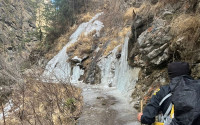National
Exam for journalists unnecessary and insignificant, say media analysts and former journalists
Ruling party lawmakers have registered an amendment proposal that would require journalists to undergo an examination to obtain a licence..jpg&w=900&height=601)
Tika R Pradhan
An amendment proposal registered by Nepal Communist Party lawmakers at the National Assembly secretariat on the controversial Media Council Bill has reignited the debate on whether journalists should have to undergo an exam to work as reporters and editors.
With online media portals rising and unreliable content proliferating across social media, a vocal section of the public has been demanding for some governmental intervention in the spread of such content. This sentiment led a group of ruling party lawmakers on Sunday to register an amendment proposal on the recently tabled Media Council Bill, proposing a provision for a ‘journalist’s licence’, which would require all journalists to pass an exam.
Journalists, however, have flatly rejected the amendment proposal on the grounds that such an exam is not necessary.
“The proposal is very much insignificant,” said Harihar Birahi, a senior journalist who has led the Press Council Nepal and the Federation of Nepali Journalists. Birahi says journalism is not a profession to be adopted based on an academic certificate; it is a profession with a unique nature.
This is not the first time the issue of examination for journalists has been raised. About four years ago, Press Council Nepal had formed a task force, led by former Supreme Court registrar Ram Krishna Timalsena, along with journalist Gunaraj Luitel and current press advisor to the prime minister Kundan Aryal as members, to study the necessity of an examination. The task force had decided in favour of an examination for young journalists in order to test their knowledge of the code of conduct, according to Deepak Khanal, the task force’s secretary. The decision was heavily criticised by journalists, especially the Federation of Nepali Journalists who said that such an examination would infringe on their right to expression.
“I wonder why this rejected issue has been raised again to incite the press,” Birahi said.
According to Shiva Gaunle, editor of the Center for Investigative Journalism, such exams have no significance as journalists go through a series of such exams every day from their large number of readers, listeners and viewers.
“While it’s not a bad thing if a formal body wants to institute an exam, it is largely insignificant for journalists, as they are already always under the scrutiny of their audience,” Gaunle told the Post.
Gaunle further questioned how practical and useful the examination would be as there is no instance in the world where journalism became more accountable due to licencing.
Media analysts and journalists believe that journalism is not like any other profession, like law, engineering or medicine, as it is directly connected to the people’s fundamental rights—the right to expression.
“It’s like saying one needs to have a certain academic degree to become a political leader, lawmaker or minister,” said Rajendra Dahal, former chairman of Press Council Nepal. “Citizens have the right to express their feelings, just like how they enjoy the right to walk on the footpath. Press freedom falls under the right to expression and it’s not good to bar or restrict press freedom.”
Qualifications for journalists are already defined in law, which states that an editor requires a bachelor’s degree or a certain number of years of experience. Even when editors have degrees from prestigious academic institutions, mistakes tend to be made. An examination or a degree is no guarantee of reliability or veracity, say media analysts.
It’s up to the readers to decide which media they wish to consume and the journalism sector itself determines what to do and what not to do, said Dahal.
“Journalists are regulated by their professional code of conduct,” he said. “They have also realised the need for necessary qualifications but it’s their problem to find an amicable solution. Lawmakers need not bother.”
Rights activists too believe that it is up to media institutions themselves to specify academic qualifications or conduct written or oral examinations before hiring journalists, so there is no need for interference from the state.
Even the fact that the government issues a press accreditation card to journalists can be considered an attempt to control independent journalism, according to Taranath Dahal of Freedom Forum, a civil liberties organisation. Requiring an examination to get a licence is a serious matter, he said.
“The ruling party’s lawmakers registered the amendment proposal but I believe they are unaware of the severity of their proposal,” he said.




 9.56°C Kathmandu
9.56°C Kathmandu














